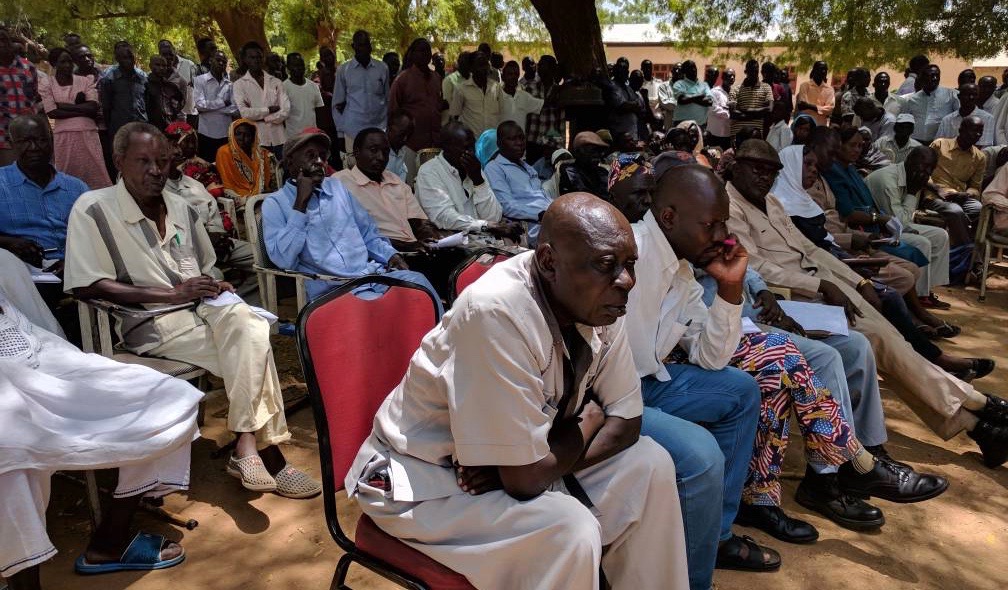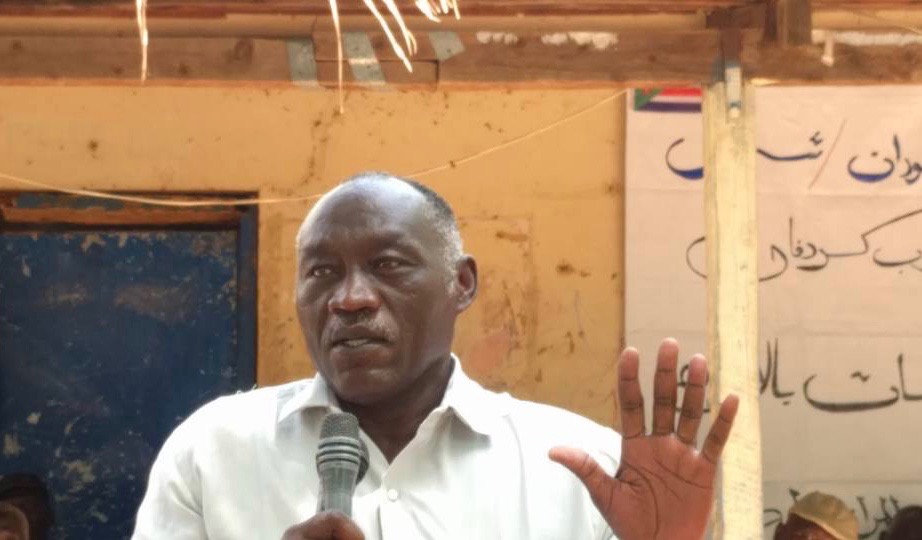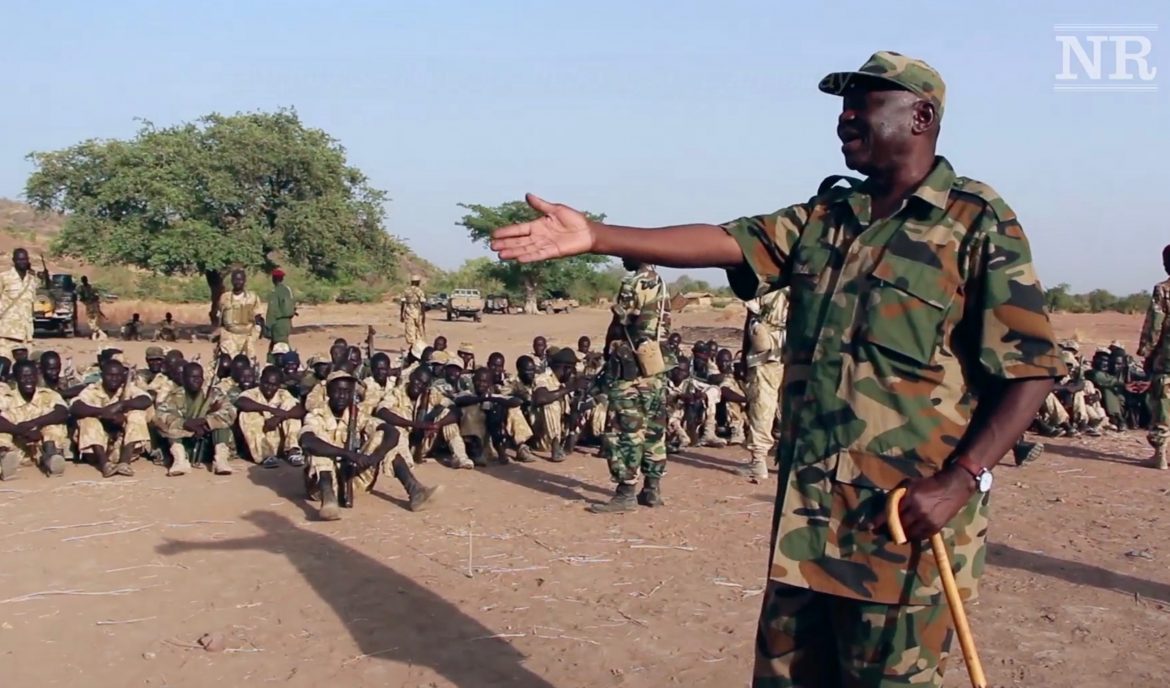The current deputy chairman to the rebel Sudan People’s Liberation Movement-North (SPLM-N), Abdelaziz Hilu, has agreed to temporarily assume leadership, according to a statement and sources on the ground. This follows a leaked Monday memo from SPLM-N Chairman Malik Agar clarifying his position and offering to step down to allow new leadership within the rebel movement.
Hilu’s announcement comes immediately after a rally on Wednesday held by the regional political body for the Nuba rebel group, in the rebel capital Kauda that called for a change in rebel leadership.
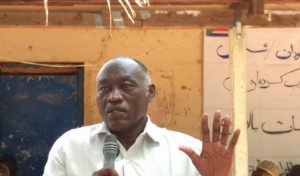
SPLM-N leader Kuku Gagdul (Musa John)
Senior SPLM-N leader Kuku Gagdul briefed the rally attendants of the position taken by the regional body, the Nuba Mountains Liberation Council (NMLC), outlining why they sought change in the senior leadership. The NMLC, with support from their sister group –the Blue Nile Liberation Council (BNLC), issued a statement calling for the removal of SPLM-N Chairman Malik Agar to be replaced with his deputy, Abdel-Aziz Hilu. The NMLC statement signed by the regional body chairman, Omer Rambawi, also prevents Agar entry to the rebel-controlled areas in South Kordofan State.
“We have been forgotten as widows,” said Nura Hassan at the rally, whose husband died in the conflict and urged Hilu to take up his role to lead the rebel movement.
Hilu says he will temporarily take the leadership position to end the political vacuum and create “unity and harmony between the different components of the Movement.” The rebel commander said he would only hold the post until the SPLM-N held the General Conference, the movement’s highest forum, after which he will “hand over the responsibility to the leadership elected by the Conference.”
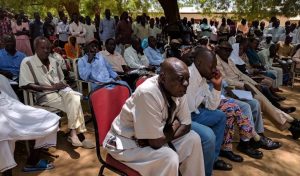
NMLC Rally in Kauda (Musa John)
The NMLC announced a similar statement after the SPLM-N Deputy Chairman issued a resignation letter in late March, citing differences with the executive leadership and their handling of the peace process in particular. Hilu’s letter questioned whether the leadership’s alleged lack of democratic rule and conciliatory tone in the peace talks adequately represented the Nuba people. According to the letter, the movement lacks a manifesto to guide them, for instance, and political bodies designed to develop democratic leadership were never formed, leaving decisions to the arbitrary will of the executive. The deputy’s letter also accused the SPLM-N leadership of omitting key demands in the peace talk process, including the right to self determination and to maintain a standing rebel army, instead of integrating into the Sudan Armed Forces.
In turn, according to a leaked June 5 internal memo seen by Nuba Reports, Agar accused Hilu of fostering internal dissent to attain power and ignoring repeated calls for internal dialogue. The SPLM-N leadership attempted to hold meetings on 17 separate occasions to contend with the internal rift and address Hilu’s concerns, the memo reads, “but he always refused to do so.” Agar claims he is willing to step down, the memo says, and form an interim leadership to oversee the next General Conference.
Agar’s memo also questions Hilu’s call for the right to self-determination, claiming this may incite ethnic divisions within the Two Areas and prolong the war, among other reasons. The memo also tried to reassure SPLM-N members that the rebel army would not integrate immediately into the national army until a gradual political process is achieved. “In no way would we give up the SPLA without achieving political objectives where a new national army reflects the interests of all Sudanese, including the people of the two regions.”
SPLM-N Spokesperson Arnu Ngutulu has issued a statement expressing his own personal support to the NMLC decision. “The next steps is for the new leader to lay down his plans and put some mechanisms in place to carry out the reform process,” he told Nuba Reports.
UN Special Envoy for Sudan and South Sudan Nicholas Haysom expressed his concern over the SPLM-N rift and how this may affect the peace process, according to news reports.
The current rift within the SPLM-N movement takes place amidst the sixth anniversary of the conflict. A ceasefire announced in January has provided much-needed respite for the civilians in the Nuba Mountains and Blue Nile. It is not certain, however, whether the cessation of hostilities will continue after November.
Unresolved promises of autonomy following South Sudan’s secession from Sudan triggered the rebel group, the Sudan People’s Liberation Army-North (SPLA-N), to rebel against Khartoum in September 2011. The civil conflict has officially closed South Kordofan and Blue Nile states to external humanitarian aid, with the two warring parties continuing to disagree on the modalities of aid delivery.

